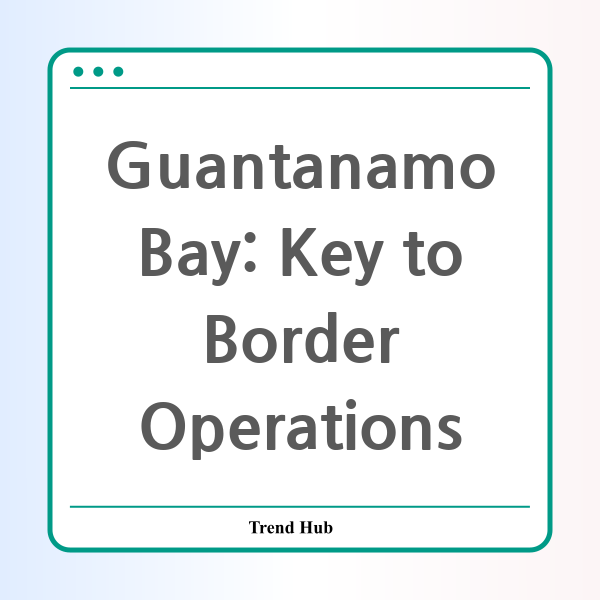* This website participates in the Amazon Affiliate Program and earns from qualifying purchases.

What Does Guantanamo Bay Mean for U.S. Border Security?
In recent news, Defense Secretary Pete Hegseth made a significant return to Naval Station Guantanamo Bay, Cuba, a location synonymous with military operations and immigration enforcement. This visit was not just ceremonial; it highlighted the ongoing role of Guantanamo Bay in the broader context of U.S. border security and immigration management.
As Hegseth addressed the service members stationed there, he emphasized the importance of their mission in supporting the Department of Homeland Security’s operations concerning illegal immigration. For many, the historical context of Guantanamo Bay as a holding facility has sparked debate and controversy over the years. However, Hegseth framed it within a current and pressing narrative—securing the U.S. southern border, which he argued, is now more crucial than ever.
Understanding the Current Operations
During his remarks, Hegseth expressed gratitude to the service members for their professionalism and dedication. He noted that their actions set the tone for how the entire U.S. government is perceived, thus reinforcing the connection between their operations and national representation. A crucial element of the discussion was the administration's push for mass deportations, a strategy that Hegseth labeled as central to the vision of a secure border.
The Personal Connection
What made Hegseth’s visit particularly poignant was his own history with Guantanamo Bay. As a former Army 2nd Lieutenant, he shared firsthand experiences from his own deployment two decades prior, creating a relatable connection with troops who are currently stationed there. His message was clear: the mission at Guantanamo Bay is recognized at the highest levels, and there is a strong commitment to support those on the ground.
Why Guantanamo Bay Matters Now More Than Ever
The future of Guantanamo Bay as a holding facility for illegal aliens was underscored by Hegseth’s announcement that operations would continue through 2025. This commitment signals a long-term strategy in dealing with immigration issues and highlights the facility's role as a pivotal component of the current administration's border control measures.
The Broader Implications
Hegseth's visit also served to counter the negative sentiment that often surrounds Guantanamo Bay operations. Acknowledging the challenges faced by the service members, he reassured them of continued support from the Defense Department and the Department of Homeland Security. The focus was not only on the immediate tasks at hand but also on the larger geopolitical implications of U.S. border security efforts.
Ultimately, Guantanamo Bay stands as a microcosm of the broader debates surrounding immigration, security, and human rights. As the operations evolve, so too will the conversations that accompany them. The future of such operations will undoubtedly be closely monitored, both by advocates and critics alike as America navigates its complex relationship with immigration control.
Conclusion: The Path Forward
As we look ahead, the implications of Guantanamo Bay’s role in U.S. border operations will remain a significant topic of discussion. The commitment shown by the service members and the support articulated by leaders like Hegseth signals that this facility is likely to remain a focal point in the nation’s efforts to address immigration and border security challenges. Understanding the dynamics at play will be essential as the nation moves forward.
* This website participates in the Amazon Affiliate Program and earns from qualifying purchases.